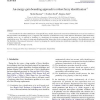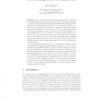701 search results - page 58 / 141 » Self Bounding Learning Algorithms |
116
click to vote
ML
2002
ACM
15 years 1 months ago
2002
ACM
We present new algorithms for reinforcement learning, and prove that they have polynomial bounds on the resources required to achieve near-optimal return in general Markov decisio...
109
Voted
JMLR
2010
14 years 9 months ago
2010
Kernel approximation is commonly used to scale kernel-based algorithms to applications containing as many as several million instances. This paper analyzes the effect of such appr...
104
click to vote
AUTOMATICA
2006
15 years 2 months ago
2006
A novel method for the robust identification of interpretable fuzzy models, based on the criterion that identification errors are least sensitive to data uncertainties and modelli...
106
click to vote
COLT
2008
Springer
15 years 4 months ago
2008
Springer
We propose a model-based learning algorithm, the Adaptive Aggregation Algorithm (AAA), that aims to solve the online, continuous state space reinforcement learning problem in a de...
123
Voted
ALT
2006
Springer
15 years 11 months ago
2006
Springer
Most of the existing active learning algorithms are based on the realizability assumption: The learner’s hypothesis class is assumed to contain a target function that perfectly c...


